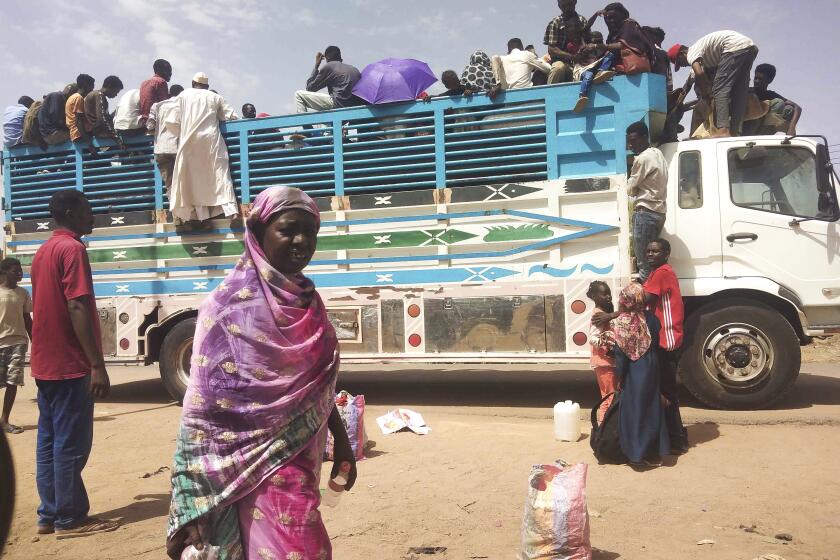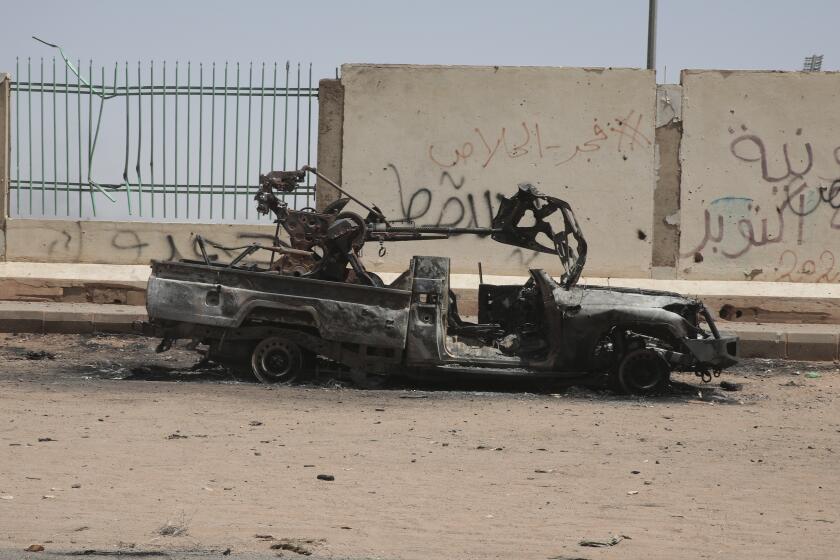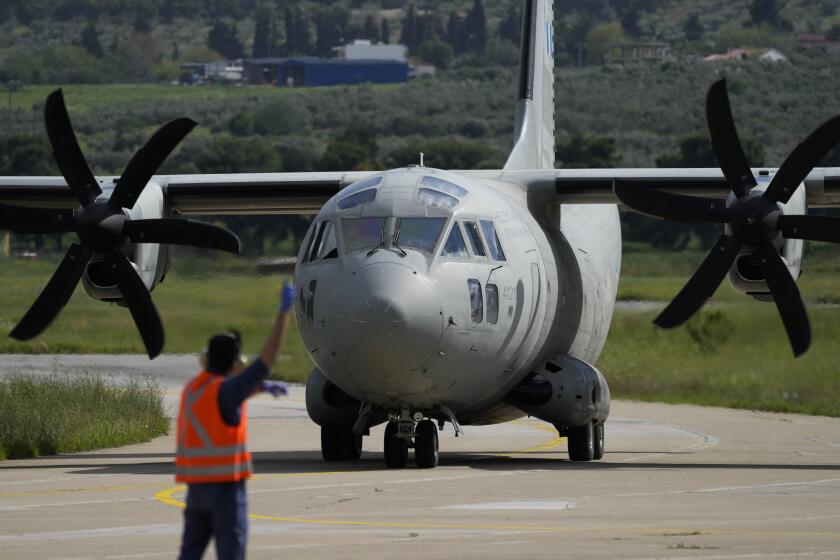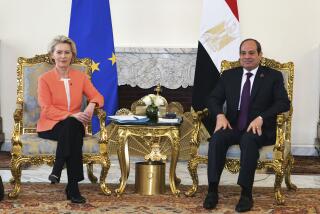World donors pledge more than $2 billion in aid for war-stricken Sudan

- Share via
PARIS — French President Emmanuel Macron announced Monday that world donors are pledging more than $2 billion in aid for Sudan, a year into a war that has pushed its population to the brink of famine.
Macron spoke at the end of an international conference in Paris aimed at drumming up support for Sudan’s people. He did not give a detailed timeline or breakdown of the funding.
In a final statement, top diplomatic envoys, U.N. officials and aid agencies gathered at the conference also urged Sudan’s warring parties to stop rights violations and allow access for humanitarian aid. Members of Sudan’s civil society took part in the Paris meeting, but neither the Sudanese army nor its rival paramilitary were represented.
Sudan descended into conflict in April last year when simmering tensions between the military and the paramilitary Rapid Support Forces exploded into open fighting in the capital, Khartoum, and elsewhere across the country.
Sudan has been torn by war for a year now between the military and the paramilitary Rapid Support Forces. Now a potential hunger catastrophe looms, aid groups say.
Macron called it “one of the worst humanitarian crises in the world,’’ that has created a ‘’real risk of famine.’’
The United Nations’ humanitarian campaign needs some $2.7 billion this year to get food, healthcare and other supplies to 24 million people in Sudan — nearly half its population of 51 million. So far, funders have given only $145 million, about 5%, according to the U.N’s humanitarian office, known as OCHA.
After Monday’s conference, Macron said, ‘’We are today at 2 billion euros for Sudan.’’
United Nations Secretary-General António Guterres urged the international community to donate generously and support the U.N. life-saving efforts to help Sudanese people, trapped in the “nightmare of bloodshed.”
More than 14,000 people have been killed and at least 33,000 have been wounded in a yearlong war. Nearly 9 million people have been forced to flee their homes either to safer areas inside Sudan or to neighboring countries, according to the U.N. Hunger, sexual violence against women and girls and continued displacement are rampant and much of the country’s infrastructure — homes, hospitals and schools — has been reduced to rubble.
Sudan and two neighboring countries, where at least a million people have fled the nearly year-old conflict, will receive the humanitarian aid.
“We cannot let this nightmare slide from view,” Guterres said in a video message to the Paris conference.
“It’s time to support the Sudanese people. It’s time to silence the guns,” he added.
French Foreign Minister Stephane Sejourne said the aim of the conference was to mobilize humanitarian funding to help Sudanese people, who have been victims of both a “terrible war” and “international indifference.”
“It’s a colossal task,” Sejourne said. “It’s a war the Sudanese people did not want, a war that only produces chaos and suffering.”
The European Union’s crisis management commissioner, Janez Lenarcic, said the 27-member bloc wants to ensure that Sudan is not forgotten as wars in Gaza and Ukraine dominate the international news.
“People of Sudan, caught up in this emergency, are almost completely invisible,” Lenarcic said. Sudan has turned into one of the worst humanitarian disasters ever on the African continent, he said, and added: “It is our duty not to look away.”
Fighting in Sudan between forces loyal to two top generals has put that nation at risk of collapse and could have consequences far beyond its borders.
President of the International Committee of the Red Cross Mirjana Spoljaric warned that humanitarian action is increasingly politicized in Sudan and humanitarian workers are risking their lives to get vital aid to people. She urged all sides in the war to facilitate a “safe, rapid, and unimpeded passage of humanitarian personnel and goods, into and within Sudan, through all available routes.”
“Securing a military advantage cannot be pursued regardless of the human cost,” Spoljaric said.
The United States and Saudi Arabia initially led efforts to find a negotiated way out of the conflict. But the efforts did not succeed, and since October the fighting has been overshadowed by the Israel-Hamas war in Gaza, which is threatening to expand into a broader regional conflict.
Relief workers, meanwhile, warn that Sudan is hurtling toward an even larger-scale calamity of starvation, with potential mass death in the coming months. Food production and distribution networks have broken down, and aid agencies are unable to reach the worst-afflicted regions.
The U.S. has invested enormous political capital in peace for Sudan, which would also benefit the fight against terrorism.
The conflict has also been marked by widespread reports of atrocities including killings, displacement and rape, particularly in the area of the capital and the western region of Darfur.
Save the Children warned that about 230,000 children, pregnant women and newborn mothers could die of malnutrition in the coming months.
“Famine is a reality in Sudan,” said Abdallah al-Dardari, a regional director of the U.N. Development Program. He appealed to diplomats gathered in Paris to help facilitate access for humanitarian aid workers and funding for vital aid for millions of people trapped in a conflict that is “rapidly deteriorating due to no respect for human rights and international law.”
The military, headed by Gen. Abdel-Fattah Burhan, and the RSF, commanded by Gen. Mohammed Hamdan Dagalo, have carved up Khartoum and trade indiscriminate fire. In 2021, Burhan and Dagalo were uneasy allies who led a military coup. They toppled an internationally recognized civilian government that was supposed to steer Sudan’s democratic transition.
Surk and Magdy write for the Associated Press. Magdy reported from Cairo.
More to Read
Sign up for Essential California
The most important California stories and recommendations in your inbox every morning.
You may occasionally receive promotional content from the Los Angeles Times.














